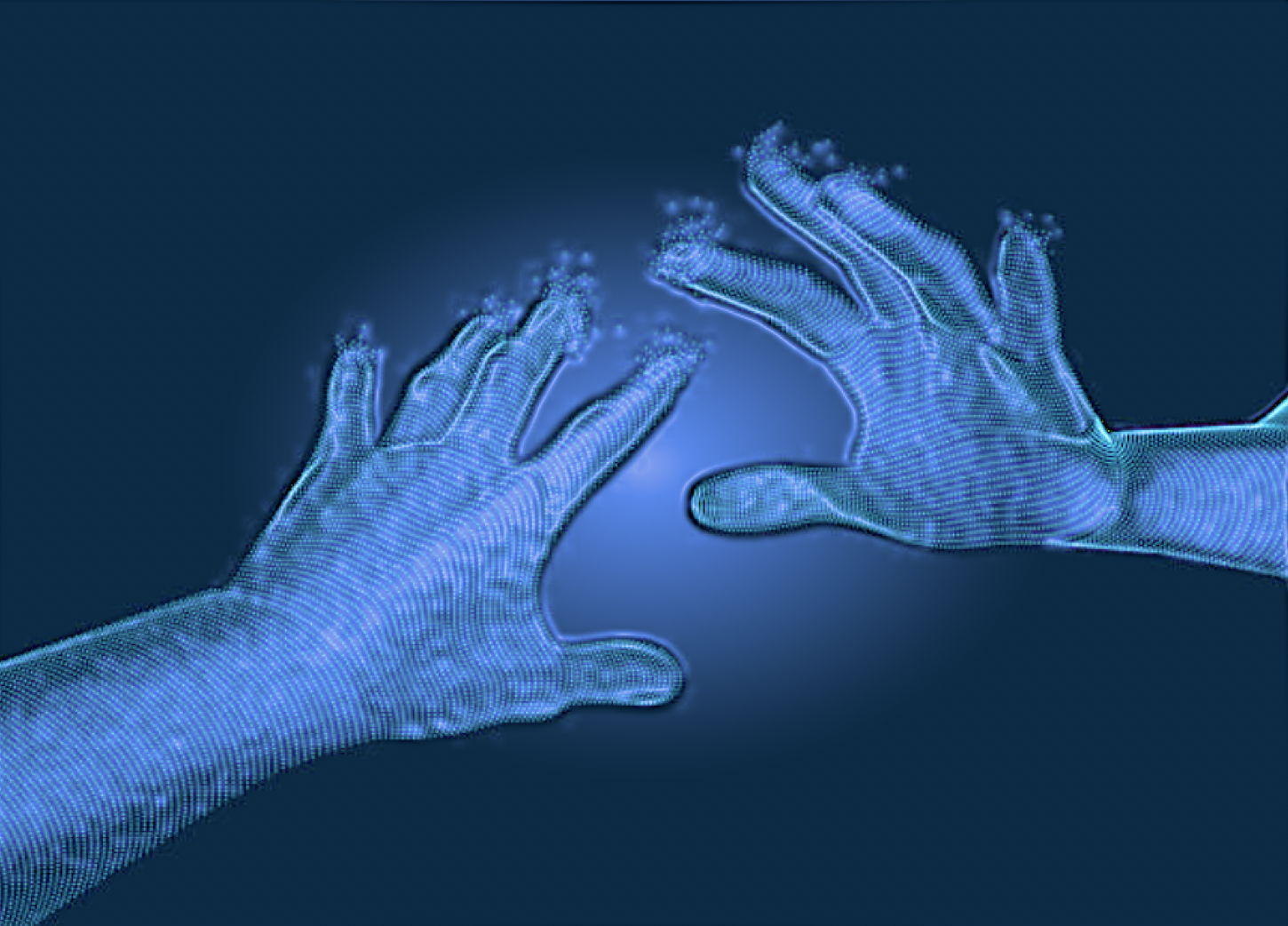A large, adult political forecast.
“Team Human” Telepresence

How to think so we can stay in control in our digital future.
Most of our “tech titans” (or whatever) have enough skin in the game to appreciate both the rewards of public life and the routine abuse that so often comes with it. As a result, they provide us regular public statements about the unfolding future—as they see it and as they would like to see it unfold.
Without such statements it would be harder to think on the fly, or in depth, about questions core to our future prospects such as “what is technology,” “what is digital,” “what is happening to us,” and “how much time do we have to stay (or get) ahead of the wave.” At the same time, these kinds of mini-briefings typically have enough nuts-and-bolts detail in them to give us a better shot at not getting lost in schematics and abstractions while trying to tackle the big questions.
Mark Zuckerberg’s latest remarks kicking off the new decade represent an important new iteration of this process.
I’m going to talk about one thread that struck me as an especially clear and powerful example of how to enter into dialogue with a high-level Silicon Valley pronouncement and what we can actionably learn right away from doing so. There are plenty of other threads to pull at in his missive. You might identify an even more valuable one.
I want to focus our attention on AR and VR—specifically, two different ways in which they might be used in the realm of telepresence. It is tempting to say one way is better than the other; and hopefully, by the end of my comments, you will come away with that general impression in a specific sense.
But your takeaway will likely turn on whether you share my assumption or principle that our naturalness as incarnate, biologically real creatures is a precious, inalienable, and perhaps even sacred characteristic of who we human beings are. My goal is to give a suggestive sketch of how what Doug Rushkoff calls a “team human” approach to telepresence can be applied to technology more broadly, and to digital technology in particular.
VR: The Danger of Televisual Enchantment
In his statement, Zuck creditably sets his gaze well ahead in a precise way. He is working on doing some forecasting—a much different exercise than simply summoning up a desirable or seemingly desirable state in the imagination and then postulating how we might approach, approximate, or instantiate it in the lived world.
I’ve tried to think about what I hope the world and my life will look in 2030 so I can make sure I’m focusing on those things. By then, if things go well… we’ll have the technology to feel truly present with another person no matter where they are.
If you are anything like me, the phrase “feel truly present” probably jumped out at you right away. I would submit this is because it is basically an oxymoron, and palpably so, but not like just any old oxymoronic statement. This one gets its big energy from expressing in speech something that’s “like magic” in a way that plays on our deepest desires for illusions to be somehow better than reality, truer to who we are.
These desires are what made televisual technology—the dominant media before digital—so commanding, consuming, controlling, and yes, dangerous. The danger is not increased physical violence; an important element of it is enchantment in the negative sense.
Think of it as a kind of morally kitschy, self-conscious “virtuous delusion.” It’s almost like a “noble lie” you tell yourself—only not noble in the old sense of elevated or renunciatory excellence. This sort of enchantment is praiseworthy more for the properties of the emotional payoff you earn by freely choosing to believe the lie than for the (nevertheless) high quality of the lie itself.
If we can see this aspect of televisual media clearly, we can already also see the mechanism behind the payoff that activates the process, leading to its conclusion in self-congratulatory embrace. There is a deep-seated human longing to present the expertly ersatz as just as good if not better than the real thing, because not everyone gets equal access to the real thing, whether we are talking about emotional goods or material ones.
That longing—for a fake thing to be real so it can be possessed by those who lack it—has manifested itself in many ways over human history. Today’s technology gives it an incredibly powerful new way of appearing at the center of our experience of our humanity. We now place ourselves into the category of emotional goods to which access must be made equal in order to make life worthy of full embrace with a good conscience.
Unfortunately, when we ourselves go into this category of goods, uncanny and unwise things unfold. So an illusion or a representation of a person becomes ethically better and more significant than the actual person themselves—to such a degree that an expert class soon arises to optimize and police discrepancies.
AR: Televisual Means Serving Incarnate Ends
We can go much further down this rabbit hole. But given what I hope is now recognizably a serious problem lurking inside, let us go ahead and compare the interpretation of “truly present” VR experience described above to that encouraged by a different kind of high-fidelity telepresence, the kind Zuck hints at here:
While I expect phones to still be our primary devices through most of this decade, at some point in the 2020s, we will get breakthrough augmented reality glasses that will redefine our relationship with technology.
Augmented and virtual reality are about delivering a sense of presence—the feeling that you’re right there with another person or in another place. Instead of having devices that take us away from the people around us, the next platform will help us be more present with each other and will help the technology get out of the way. Even though some of the early devices seem clunky, I think these will be the most human and social technology platforms anyone has built yet.
At first blush, this sounds a lot like a rephrase or restatement of the initial, semi-oxymoronic form of “feeling truly present.” But at least for me, thinking about what use cases leap to mind from this second account suggests important differences.
Here, instead of the use case being a psychodramatic one—getting enveloped in the pathos or catharsis of illusion or representation as a heaven’s gate to egalitarian emotional communion—it’s, to be blunt, excellence and efficiency in conspiracy formation and execution.
Here, instead of a gnostic escape into divine sparkdom, away from the affrontery of our disgustingly unequal and limited clay bodies, we have end-to-end encrypted private high-fidelity telepresence, radically strengthening the power of actionable group trust.
In other words, the contrast is between televisual means serving the ends of incarnate reality—natural people being and doing actual things in the given world—rather than televisual means serving the ends of unreality, of an illusory realm that asserts a claim of ethical superiority over the naturally real.
There’s a huge difference in moral-cultural trajectories between the two kinds of accounts. It raises big questions about status, prestige, and power. And hopefully it calls us to remember that our given bodies and the given world have primary, fundamental worth and value, no matter how potent our illusions.
All this just from pausing to consider carefully how we benefit from thinking along with Zuck about the decade to come.
As Facebook continues its move toward private comms, Twitter explores a new potential phase of significant decentralization, cryptocurrency regimes continue to strengthen their global presence, and encrypted peer-to-peer internet systems like Urbit roll out and gain users, regular reading and interpretation exercises like this one provide us with a way to develop knowledge and maintain psychological vitality as the digital age sets in.
The American Mind presents a range of perspectives. Views are writers’ own and do not necessarily represent those of The Claremont Institute.
The American Mind is a publication of the Claremont Institute, a non-profit 501(c)(3) organization, dedicated to restoring the principles of the American Founding to their rightful, preeminent authority in our national life. Interested in supporting our work? Gifts to the Claremont Institute are tax-deductible.
The case of Reddit shows how bad it’s gotten.
Reject the fiction of perfection for the messiness of the world outside your head.
We must protect the free expression of the past as much as for ourselves and our inheritors.
Wokeness is creeping into video games.
Big Tech poses a formidable challenge to maintaining self-government in the digital age.






